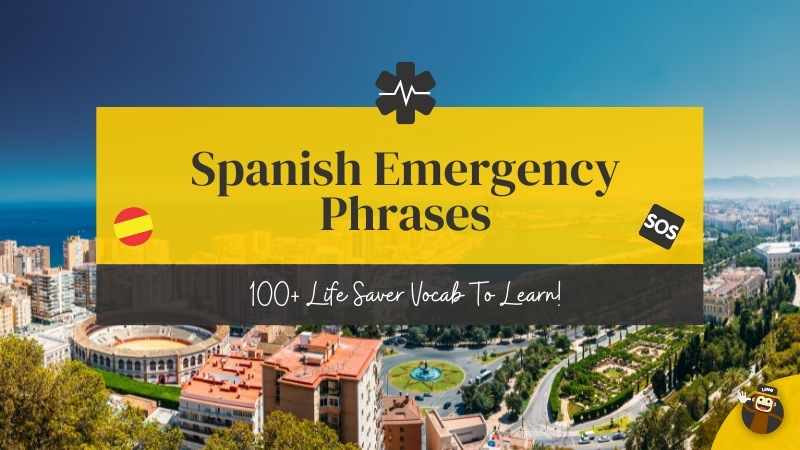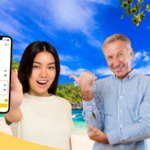Imagine having an emergency in a foreign country and not being able to communicate. Such despair! A Language barrier during difficult moments is something that a foreigner should always avoid. That is why learning Spanish emergency phrases is essential before traveling.
Whether you are sick or have had an accident, the following guide of life-saving words and phrases will help you survive different emergencies. Although we tend to say that nothing will happen to us, we do not know for sure. And therefore, we must always be very prepared in advance!
So, let this post guide you through some Spanish examples that you can practice with your Spanish-speaking friends before your trip. Let’s begin!
How To Say Help In Spanish?
Help in Spanish is ‘Ayuda.’ If you want to say help me, use the word ‘Ayúdame.’
In Spanish, we have more than one word that you can use to say ‘Help.’
How To Ask For Help In Spanish?
¿Cómo pedir ayuda en Español? (How to ask for help in Spanish?) Before learning more Spanish words, let’s learn the basic phrases that you can use to start a conversation whenever you need help. Knowing these emergency phrases in Spanish will save you in many situations during a trip to a Spanish-speaking country. It is the base of letting the other person know that you require assistance.
You will notice that I will include formal, informal, and neutral ways of saying the exact phrase in all these categories. Whenever required, I will include ‘por favor’ (please), as I believe it’s a must-say word, no matter how challenging your situation is. You should always be polite.
Ayúda, por favor! – Help, please! (Neutral)
Necesito ayuda. – I need help (Neutral)
¿Puedes ayudarme, por favor? – Can you help me, please? (Informal)
¿Puede ayudarme, por favor? – Can you help me, please? (Formal)
¿Puede ayudarme? Can you help me? (Formal)
¿Podría ayudarme? – Can you help me? (Formal)
¿Podrías ayudarme? – Can you help me? (Informal)
Ayúdeme, por favor. – Help me, please. (Formal)
Ayúdame, por favor. – Help me, please. (Informal)
What About When You Are Sick?

If you get sick abroad, there are some essential phrases you should know to communicate what is hurting or what you need.
No me siento bien. – I don’t feel well.
Me duelen las piernas. – My legs hurt.
Me duele la cabeza. – My head hurts.
Me duele el estómago. – I have a stomach ache.
Tengo dolor de garganta. – I have a sore throat.
Me duele la garganta. – My throat hurts.
Tengo calambre. – I have cramps.
Estoy mareada/o. – I am dizzy.
Necesito vomitar. – I need to vomit.
Tengo una fuerte fiebre. – I have a strong fever.
Por favor llame a un servicio de emergencia. – Call an emergency service.
Necesito mis pastillas, por favor. – I need my pills, please.
Necesito mi medicina. – I need my medicine.
¿Dónde está el hospital más cercano? – Where is the nearest hospital?
Who To Talk To In An Emergency During Your Trip In A Hispanic Country?
It all depends on your problem. The first thing you can do is call the respective emergency number of the country in which you are. If someone robbed you, go to the police station (estación de policía) as soon as possible. If you need a doctor, go to a hospital (hospital), or ask for an ambulance (ambulancia).
In addition, if you need assistance with something regarding personal problems, your country’s embassy can be of great help. Think of that space as a safe zone.
Let’s look at some emergency phrases in Spanish that can help you during different situations.
Spanish Emergency Phrases
The following list of phrases is categorized depending on the situation. They can be helpful whenever you need assistance, or when you want to help a native speaker.
You never know what kind of situations you might encounter during your trip around Hispanic countries. As we say in Spanish, ‘Es mejor prevenir que lamentar‘ (Better safe than sorry).
Do you agree? Then keep reading!
General Spanish phrases For Emergency Situations
¿Alguien habla inglés aquí? – Does anybody speak English here?
Tengo una emergencia. – I have an emergency.
Necesitamos ayuda. – We need help.
Ella está llamando al 911. – She is calling 911.
Deja que te ayude.- Let me help you.
Necesitas ayuda? – Do you need any help?
Necesita ayuda (señor/a)?. – Do you need any help (Mrs/Mr.)?
¿Te puedo ayudar? – Can I help you?
Solucionamos el problema con la ayuda de la policía. – We solve the problem with the help of the police.
Other General Spanish Words:
Essential Phrases When You Need Medical Help
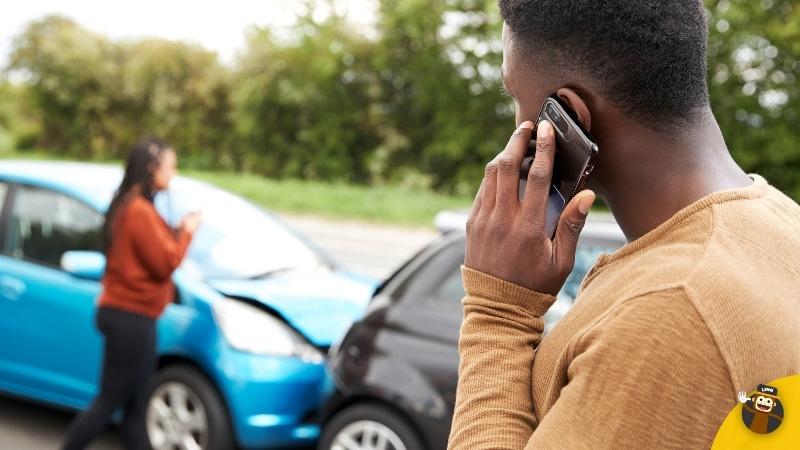
The following phrases are great to know for medical emergencies. People who never get sick during a vacation trip abroad, bless you for being so lucky! But it can happen, so you better learn some words beforehand.
Acabo de chocar. – I just crashed.
Me acabo de chocar en el auto que renté. – I just crashed in the car I rented.
Hubo un accidente automovilístico. – There was a car accident.
Tuve un pequeño accidente. – I had a minor accident.
Me caí de mi moto. – I fell off my motorbike.
Ayúdeme a llamar a mi seguro, por favor. – Please help me call my insurance.
¡Necesito una ambulancia! – I need an ambulance.
¡Llama a una ambulancia! – Call an ambulance!
Señora, ¿puede por favor llamar a una ambulancia? – Ma’am, can you please call an ambulance?
Necesito un doctor. – I need a doctor.
Necesito ir a emergencias ahora. – I need to go to the emergency room now.
Necesito urgente ir a un hospital. – I need to go to a hospital urgently.
Me duele mucho. – It hurts a lot.
Tengo náuseas. – I feel nauseous.
Me intoxiqué con la comida. – I got food poisoning.
Creo que me voy a desmayar. – I think I’m going to faint.
Mi amigo perdió el conocimiento. – My friend passed out.
¡Lléveme a un hospital! – Take me to the hospital!
Creo que me rompí el brazo. – I think I broke my arm.
Creo que me rompí la pierna. – I think I broke my leg.
No siento mi pierna. – I don’t feel my leg.
Me golpeé la cabeza muy fuerte. – I hit my head very hard.
Me duele el estómago. – My stomach hurts.
¿Dónde te duele? – Where does it hurt?
Me duele aquí. – It hurts here.
Me duele el pecho. – My chest hurts.
Me duele cuando respiro. – It hurts when breathing.
No puedo respirar bien. – I can’t breathe properly.
Soy alérgico a la penicilina. – I’m allergic to penicillin.
Me duele este diente. – This tooth hurts.
Mi tipo de sangre es AB. – My blood type is AB.
Léveme a la farmacia, por favor. – Take me to the pharmacy, please.
¿Dónde encuentro una farmacia? – Where can I find a pharmacy?
¿Dónde me puedo vacunar? – Where can I get vaccinated.
¿Dónde puedo hacerme exámenes médicos? – Where can I get tested?
Necesito un curita. – I need a bandaid.
Necesito una pastilla para el dolor de cabeza. – I need a pill for a headache.
Necesito una pastilla para el cólico menstrual. – I need a pill for menstrual cramps.
¿Me podría dar un termómetro, por favor? – Can I have a thermometer, please?
Talking To The Police: Useful Phrases
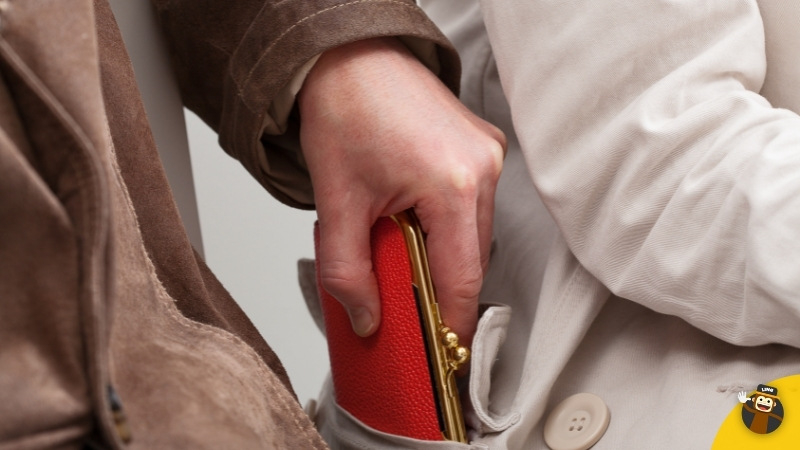
In emergencies such as attacks or robberies, it is indispensable to contact the police of the region you are staying in as quickly as possible. You can also be vigilant if you see security guards around that may be able to assist you.
No se cómo llegar a mi hotel. – I don’t know how to get to my hotel.
Desapareció mi hijo/a. – My daughter/son got lost.
Me robaron el celular. – My cellphone was stolen.
Perdí mi pasaporte. – I lost my passport.
Me robaron el pasaporte en el semáforo. – My passport was stolen at the traffic light.
Dejé mi cartera en el metro. – I left my purse inside the subway.
Me asaltaron en el mall. – I was robbed in the mall.
¡Llame a la policía rápido, por favor! – Please quickly call the police!
Un hombre me estaba acosando. – A man was harassing me.
Me acaban de atacar en esta calle. – I was attacked in this street.
Adúdeme a encontrar mi billetera, por favor. – Please help me find my wallet.
Esta es mi cédula de identidad. – Here is my ID.
Tenga mi licencia de conducir. – Here is my driver’s license.
Perdí las llaves de mi carro. – I lost my car keys.
Me robaron el auto! – My car was stolen!
Note: As you can see, there are many ways to say ‘car’ in Spanish. Auto, carro, automóvil… It all depends on the region!
If You See A Fire?
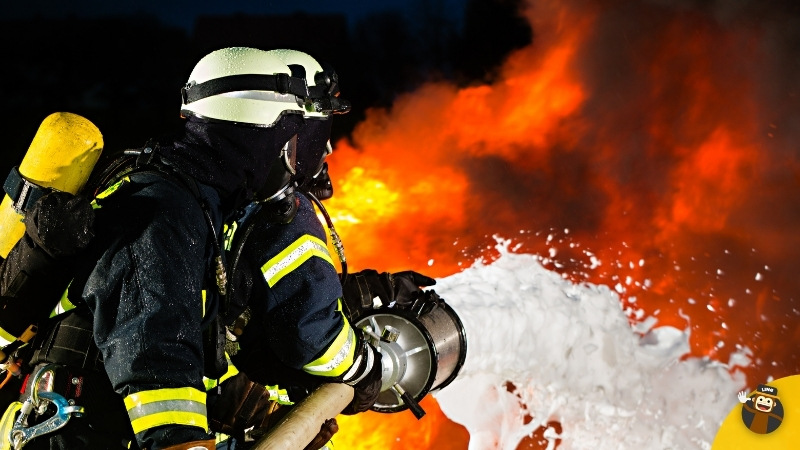
Situations like this require people to act fast. Before anything, you should be ready to escape to a safer place, and then you can call the firefighters and ask for help.
¡Hay un incendio! – There’s a fire!
Hay mucho humo viniendo de la cocina. – There’s a lot of smoke coming out of the kitchen.
¡Algo se está quemando en la casa! – Something is burning in the house!
¡Se está incendiando ese edificio! – That building is burning down!
El edificio está en llamas. – The building is on fire.
¡Hay que llamar a los bomberos! – We have to call the firemen!
¡Aún hay gente adentro del edificio! – There are still people inside the building!
Asking For Help In Your Hotel
Do you think you will always stay at a hotel or guesthouse where the staff speaks perfect English? What if they don’t? Have this useful Spanish vocabulary up your sleeve.
¿Dónde se encuentra la embajada de…? – Where is the embassy of —?
Perdí las llaves de mi habitación. – I lost my room key.
Mi amiga se quedó atrapada en el ascensor. – My friend got locked inside the elevator.
No puedo jalar la cadena del retrete. – I can’t flush the toilet.
Hay una tubería rota en mi habitación. – There’s a broken pipe in my room.
No tengo agua caliente en la ducha de mi habitación. – I don’t have hot water in my room’s shower.
No funciona el televisor. – The TV doesn’t work.
Me ayuda a conseguir un chofer para el aeropuerto, por favor? – Can you help me get a driver to the airport, please?
Alguien ha estado gritando en la habitación de a lado. – Someone has been yelling in the next room.
¿Podrías darme una guía de viaje? – Could you please give me a travel guide?
Perdí mi vuelo. Necesito reservar otra noche en el hotel. – I lost my flight. I need to book another night at the hotel.
Stay Safe During An Emergency In Your Trip to A Hispanic Country!
When traveling in a foreign country, you should be extra careful. In addition to taking good care of yourself, knowing the language can help you a lot. Remember that not everywhere in a country will have people who can speak to you in English or another language. So be prepared for everything with these Spanish emergency phrases.
Your language learning journey is just beginning. Do you want to be a tourist in many Hispanic countries? In that case, there are many more words and phrases yet to learn, including Spanish slang words!
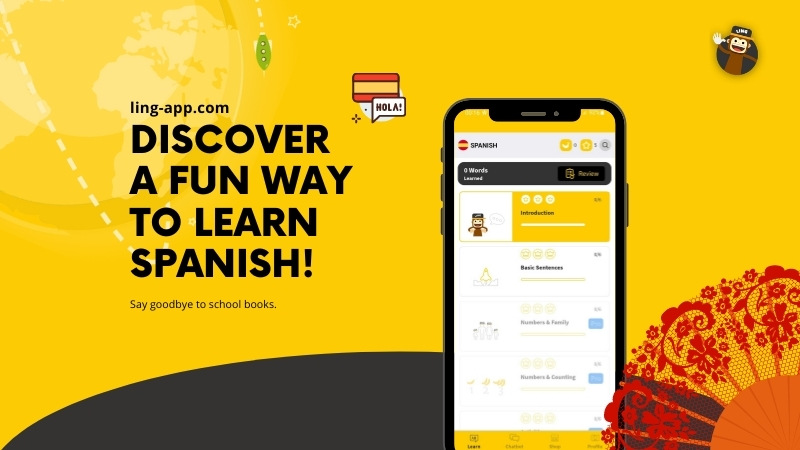
Ling App is here to help you master that desired Spanish level. Ling is the resource that allows you to study Spanish as if you were playing a game. You can learn daily life vocabulary to engage in meaningful conversations with the locals and save yourself from emergencies while traveling abroad.
Make your days easy, create connections, have fun, sound like a native, and enjoy your travel! Don’t waste any more time and start learning Spanish today.
